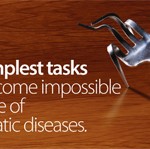
On the walls of my examining rooms, I have the ACR flyer forewarning visitors about the decreased access Medicare patients will have to rheumatologists, other physicians, and a variety of medical services if the sustainable growth rate (SGR) is not modified by the end of 2011. The interest in this flyer has only intensified in the past few weeks as patients have raised concerns about the debt ceiling talks and what is going to happen with Medicare. One of my elderly female patients explained that she relies on Medicare for her insurance and without it she wouldn’t be able to afford her medical care. I had another patient who needed a colchicine prescription, where the cost of the medicine has skyrocketed from pennies to hundreds of dollars because they were in the Medicare Part D “doughnut hole.” Other patients have concerns about their potential costs of and access to Medicare Part B infusion drugs in their rheumatologist’s outpatient office if the new reimbursement formula of the average sales price plus 4% is instituted in 2012.
Whenever I get together with colleagues, the future of reimbursement inevitably becomes the topic of conversation. Initially, we discuss problems that affect our patients. The give and take is helpful when we are discussing complex patients and trying to brainstorm a diagnosis or treatment plan. Unfortunately, in the last few years the more common themes that take over our mental energy have been the topics of insurance burdens, Medicare issues, etc. The final common pathway of all these issues is access to care. We all know that patients need access to rheumatologists, access to testing, and access to treatment options. We need to help our patients overcome these barriers by advocating on their behalf and teaching them how to be their own advocates.
No Excuses
I know what you are going to say: “But Dr. Borenstein, I don’t have the time to advocate. I am too busy seeing patients and doing all of the busy administrative work that insurers and Medicare keep piling on.” That is precisely why it is important for Congress to hear your concerns. Members of Congress are dealing with thousands of issues, so it literally comes down to the squeaky wheel. It is now time for rheumatology health professionals to make noise and have our voices heard. Make a call. Send an e-mail. Visit a congressional office.
For 10 years, the physician community has battled to repeal the SGR, the formula that determines physician Medicare reimbursement. Last year alone, we faced four separate cuts and now face a 29.5% cut in 2012. How can we, whether in private or academic practice, plan for the future if we are unsure of our revenue? Congress recognizes the problem and the cost, but continually responds that they don’t know how to fix it. Frankly, we cannot afford a 29.5% cut. Patients cannot afford for us to lose our reimbursement. It is essential that we are there for our patients. Congress needs to deliver a solution for us, for our patients, for their families, and for the future.
I Have a Story to Tell, and So Do You
I am a rheumatologist and I have a story to tell. I have a story to tell about patients needing care. I have a story about a distressed patient being rolled into my office but leaving my office walking. I have a story about a patient who had seen several other physicians before coming to me and being properly diagnosed and appropriately treated. How many times, as rheumatologists, have we heard the statement, “You are my last hope because you can figure out my problem?” Congress needs to hear who we are and the services we provide. They need to hear it from me. They need to hear it from you. They need to hear it from our staff. They need to hear it from our patients.
